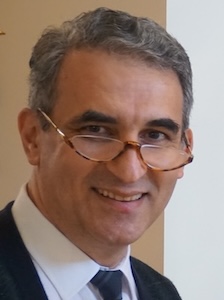The International Neuromodulation Society (INS) recently welcomed Prof. Konstantin Slavin as its new President. A distinguished neurosurgeon with expertise in functional and stereotactic neurosurgery, Prof. Slavin brings over 30 years of experience, including notable contributions to chronic pain management, movement disorders, epilepsy, and psychiatric conditions. touchNEUROLOGY extends its best wishes for a successful presidency.
 In a recent episode of The Neuromodulation Podcast Prof. Slavin shares his career journey and talks about his passion for enhancing patients’ quality of life, especially in cases where conditions may not be life-threatening but are deeply disabling. This mission has driven his commitment to advancing neuromodulation, a field he notes has evolved from its “science fiction” roots to an increasingly accepted medical solution.
In a recent episode of The Neuromodulation Podcast Prof. Slavin shares his career journey and talks about his passion for enhancing patients’ quality of life, especially in cases where conditions may not be life-threatening but are deeply disabling. This mission has driven his commitment to advancing neuromodulation, a field he notes has evolved from its “science fiction” roots to an increasingly accepted medical solution.
In the podcast, Prof. Slavin discusses his career path, sharing insights on the importance of multidisciplinary collaboration and how advancements in neuromodulation are making an impact on healthcare. His focus remains on improving patient quality of life through treatments for chronic pain, movement disorders, epilepsy and psychiatric conditions, as well as emerging applications like treating Alzheimer’s, sleep apneoa and spinal cord injuries.
As INS President, Prof. Slavin envisions a future where neuromodulation is accessible to more patients worldwide. He emphasizes the ethical considerations around new technologies, such as artificial intelligence and brain-computer interfaces, and the importance of evidence-based research.
On his vision for neuromodulation Prof. Slavin told us:
“Neuromodulation today comprises a variety of safe and effective therapies used in the treatment of many chronic conditions, ranging from chronic pain, movement disorders and epilepsy to gastrointestinal, urological, cardiovascular and psychiatric disorders, just name a few, with the main goal to improve patients’ quality of life. With continuous advancements in technology, neuromodulation is now delivered with devices that stimulate nerves, spinal cord and brain with electricity, chemicals, light, or even vibrations; this versatility has led to promising treatments for a wide range of conditions, from sleep apnoea to cognitive disorders. With its 35-year history of constant growth, the International Neuromodulation Society plays a vital role in promoting research, education, collaboration, and the global dissemination of knowledge in this field. I am excited to lead the Society as practitioners continue to refine and explore applications, and the future of neuromodulation holds great promise for improving patient care.”
With his expertise, vision and dedication, Prof. Slavin is helping shape the future of neuromodulation to ensure it becomes an essential and accessible component of global healthcare.
Don’t miss this insightful conversation with a true pioneer in the field, which is available now.
Learn more about the INS here.
Disclosures: This short article was prepared by touchNEUROLOGY. No fees or funding were associated with its publication.


